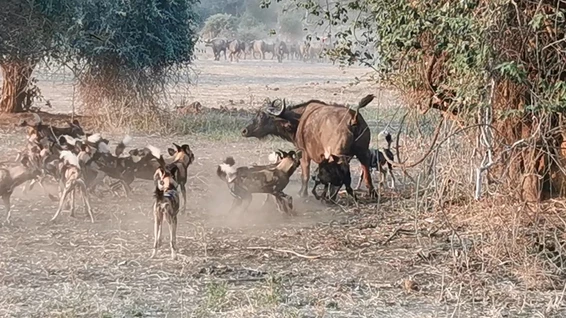phpBB [video]
African Wild Dog
- Richprins
- Committee Member
- Posts: 76089
- Joined: Sat May 19, 2012 3:52 pm
- Location: NELSPRUIT
- Contact:
Re: African Wild Dog
Please check Needs Attention pre-booking: https://africawild-forum.com/viewtopic.php?f=322&t=596
- Richprins
- Committee Member
- Posts: 76089
- Joined: Sat May 19, 2012 3:52 pm
- Location: NELSPRUIT
- Contact:
Re: African Wild Dog
Please check Needs Attention pre-booking: https://africawild-forum.com/viewtopic.php?f=322&t=596
- Lisbeth
- Site Admin
- Posts: 67563
- Joined: Sat May 19, 2012 12:31 pm
- Country: Switzerland
- Location: Lugano
- Contact:
Re: African Wild Dog
They are late! I said so a couple of months ago 

"Education is the most powerful weapon which you can use to change the world." Nelson Mandela
The desire for equality must never exceed the demands of knowledge
The desire for equality must never exceed the demands of knowledge
- Richprins
- Committee Member
- Posts: 76089
- Joined: Sat May 19, 2012 3:52 pm
- Location: NELSPRUIT
- Contact:
Re: African Wild Dog
IN PHOTOS: GPS collars are a saving grace for Kruger’s wild dogs
Between 1995 and 2009, the African wild dog population in the Kruger National Park (KNP) faced a concerning decline. In recent years, however, the outlook for this species has started to look up again.
49 mins ago
Linzetta Calitz
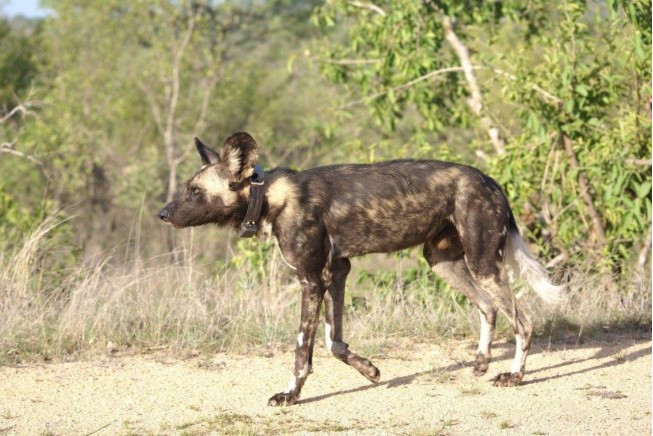
A wild dog with a GPS satellite tracking collar. > Photo: Supplied
Wild dog numbers in general are still in decline, but the Kruger population numbers are not.
Grant Beverley of the Endangered Wildlife Trust’s (EWT) carnivore conservation programme said the Kruger’s wild dog numbers are currently between 300 and 350.
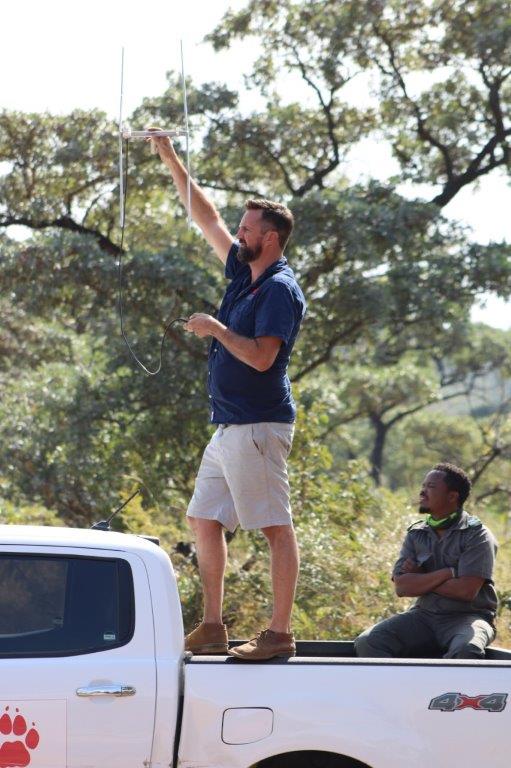
This shows the strides that have been made from the measly all-time low of 120 in 2009. The aim is higher still, though, as before the decline the number had stood at about 450.
One of the main reasons this steady increase has been possible is due to a collaborative collaring project between SANParks and the EWT.
GPS satellite tracking collars enable a near real-time monitoring platform. This platform specifically has been running since last year.
Grant Beverley holds an antenna, receiving a signal which helps to determine where and how far the wild dogs are.
Near real-time refers to the two-hourly updates that are received from the collars. Location data is recorded, stored onboard and transmitted via a network of satellite or ground-based receivers that process the data and relay this information to a central database.
When trying to check in on certain packs, a recording of wild dog calls is played from a vehicle. The dogs then follow this sound. There are two different sounds described either as a “hoo-call” or as “chittering”.
Of the 30 wild dog packs found in the Greater Kruger area, 21 of them are currently being monitored through these R65 000 collars. The goal is to have all 30 packs trackable within the next few months, said Beverley. Luckily, only one animal in the pack needs to be collared.
Pack members look on curiously as the recorded sounds play.
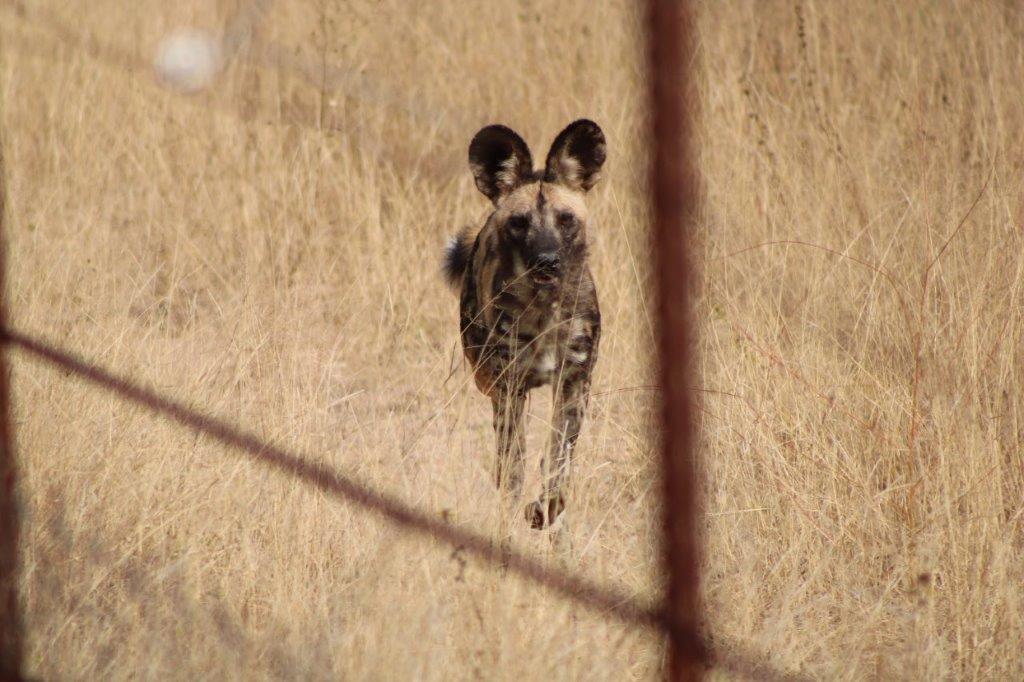
A member of the pack comes running.
Initially, this was the alpha male, but in recent years, it has become one of the females (specifically not the matriarch, however, seeing as she goes into “denning” for one to two months out of the year when having pups, during which time she does not move with the pack).
This change came about after researchers realised that a female’s position is more rigid, whereas alpha males are sometimes challenged out of their position and then, more often than not, leaves the pack to find another one.
Considering the collars have little to no effect on animal behaviour, Beverley said their benefits far outweigh any concerns.
Threats that wild dogs face inside and outside the park, can be any of the following
Persecution because of the threat they pose to livestock outside the park
Due to their wide-ranging behaviour, wild dogs tend to frequently exit protected areas where they encounter human elements. During the past few years, between 10 and 20 wild dogs have been shot.
Accidents with vehicles or trains
Three dogs were recently killed by a train and five were hit by cars in the past two years.
Snares
During the past six years, at least 40 snared wild dogs were reported. Twenty-nine of these could be saved; the rest either died or were never seen again.
SANParks vets removed a snare from this wild dog and saved its life.
> Photo: SANParks
Disease (rabies or the canine distemper virus (CDV))
Once again, the human element comes into play. These are diseases prevalent in domestic canines surrounding the KNP. In 2016, CDV claimed the lives of an entire pack in the Kruger.
https://lowvelder.co.za/731001/in-photo ... wild-dogs/
Between 1995 and 2009, the African wild dog population in the Kruger National Park (KNP) faced a concerning decline. In recent years, however, the outlook for this species has started to look up again.
49 mins ago
Linzetta Calitz

A wild dog with a GPS satellite tracking collar. > Photo: Supplied
Wild dog numbers in general are still in decline, but the Kruger population numbers are not.
Grant Beverley of the Endangered Wildlife Trust’s (EWT) carnivore conservation programme said the Kruger’s wild dog numbers are currently between 300 and 350.

This shows the strides that have been made from the measly all-time low of 120 in 2009. The aim is higher still, though, as before the decline the number had stood at about 450.
One of the main reasons this steady increase has been possible is due to a collaborative collaring project between SANParks and the EWT.
GPS satellite tracking collars enable a near real-time monitoring platform. This platform specifically has been running since last year.
Grant Beverley holds an antenna, receiving a signal which helps to determine where and how far the wild dogs are.
Near real-time refers to the two-hourly updates that are received from the collars. Location data is recorded, stored onboard and transmitted via a network of satellite or ground-based receivers that process the data and relay this information to a central database.
When trying to check in on certain packs, a recording of wild dog calls is played from a vehicle. The dogs then follow this sound. There are two different sounds described either as a “hoo-call” or as “chittering”.
Of the 30 wild dog packs found in the Greater Kruger area, 21 of them are currently being monitored through these R65 000 collars. The goal is to have all 30 packs trackable within the next few months, said Beverley. Luckily, only one animal in the pack needs to be collared.
Pack members look on curiously as the recorded sounds play.

A member of the pack comes running.
Initially, this was the alpha male, but in recent years, it has become one of the females (specifically not the matriarch, however, seeing as she goes into “denning” for one to two months out of the year when having pups, during which time she does not move with the pack).
This change came about after researchers realised that a female’s position is more rigid, whereas alpha males are sometimes challenged out of their position and then, more often than not, leaves the pack to find another one.
Considering the collars have little to no effect on animal behaviour, Beverley said their benefits far outweigh any concerns.
Threats that wild dogs face inside and outside the park, can be any of the following
Persecution because of the threat they pose to livestock outside the park
Due to their wide-ranging behaviour, wild dogs tend to frequently exit protected areas where they encounter human elements. During the past few years, between 10 and 20 wild dogs have been shot.
Accidents with vehicles or trains
Three dogs were recently killed by a train and five were hit by cars in the past two years.
Snares
During the past six years, at least 40 snared wild dogs were reported. Twenty-nine of these could be saved; the rest either died or were never seen again.
SANParks vets removed a snare from this wild dog and saved its life.
> Photo: SANParks
Disease (rabies or the canine distemper virus (CDV))
Once again, the human element comes into play. These are diseases prevalent in domestic canines surrounding the KNP. In 2016, CDV claimed the lives of an entire pack in the Kruger.
https://lowvelder.co.za/731001/in-photo ... wild-dogs/
Please check Needs Attention pre-booking: https://africawild-forum.com/viewtopic.php?f=322&t=596
- Lisbeth
- Site Admin
- Posts: 67563
- Joined: Sat May 19, 2012 12:31 pm
- Country: Switzerland
- Location: Lugano
- Contact:
Re: African Wild Dog
Rather informative 
"Education is the most powerful weapon which you can use to change the world." Nelson Mandela
The desire for equality must never exceed the demands of knowledge
The desire for equality must never exceed the demands of knowledge
- Lisbeth
- Site Admin
- Posts: 67563
- Joined: Sat May 19, 2012 12:31 pm
- Country: Switzerland
- Location: Lugano
- Contact:
Re: African Wild Dog
In 2019 seven endangered African painted dogs travelled from Port Lympne Reserve, GB to the African sunshine of Gabon’s Parc de la Lékédi thanks to the work of The Aspinall Foundation and partners from Sodepal and Cargolux.
The pack, led by a six-year old male named Five, left Kent and travelled via Eurotunnel to Luxembourg before being carefully loaded onto a flight to Brazzaville in Congo which was generously provided free of charge by Cargolux.
The final 340 mile leg of their journey from Congo to Parc de la Lékédi took more than 20 hours by road.
Damian Aspinall, Chairman of The Aspinall Foundation said: ‘This historic move could be the start of something very important to save these endangered dogs from extinction. It’s been over 25 years since painted dogs were spotted in Gabon and, whilst this is just the beginning, it would be wonderful to restore wild packs to the area in the future. ‘
The African painted dog pack were cared for during their entire journey by Port Lympne Reserve’s Animal Manager and African Painted Dog European studbook keeper, Richard Barnes.
"Education is the most powerful weapon which you can use to change the world." Nelson Mandela
The desire for equality must never exceed the demands of knowledge
The desire for equality must never exceed the demands of knowledge
- Lisbeth
- Site Admin
- Posts: 67563
- Joined: Sat May 19, 2012 12:31 pm
- Country: Switzerland
- Location: Lugano
- Contact:
Re: African Wild Dog
The science behind rebranding wild dogs
Posted on July 14, 2021 by Team Africa Geographic in the DECODING SCIENCE post series.
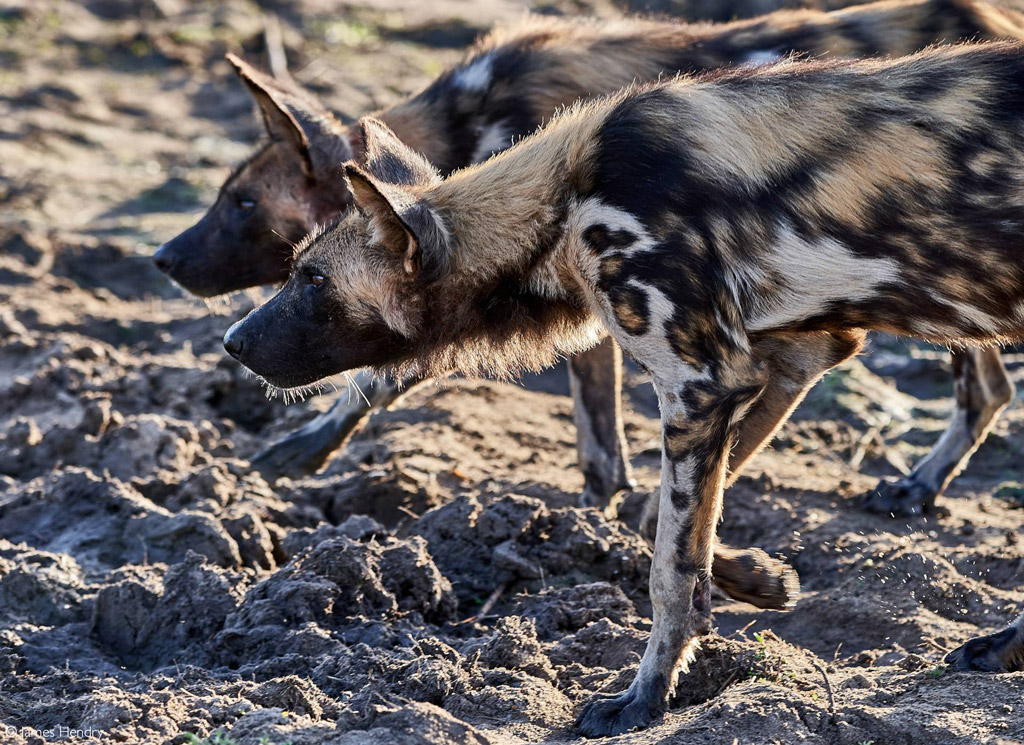
From individual identities to brands, names carry significant weight in human interpretation. The words associated with particular objects or animals create a series of mental connections and a perception of certain qualities or traits. For this reason, some scientists have been calling for a rebranding of the African wild dog – to escape the negative connotations and associations with stray or feral domestic dogs. However, the IUCN and many conservation organisations still refer to them as African wild dogs. A recent paper puts forward an evidence-based approach for understanding the conservation implications behind the vernacular name of choice for the charismatic Lycaon pictus.
The scientific name Lycaon pictus translates roughly into a “painted wolf-like creature”, but the African painted wolf belongs to a distinct genus only distantly related to either domestic dogs or wolves. It is well-established that painted wolf populations have suffered dramatically through human persecution and habitat loss throughout the continent. In many situations, they are still perceived as blood-thirsty and brutal predators. The question is whether their name has contributed to this persecution and whether or not a rebranding could invest people in their conservation.
The author, ecologist Bryony Blades, was inspired by the 4th episode of BBC’s Dynasties, titled “Painted Wolf”, and the subsequent debate that resurfaced with little evidence-based support on either side. To provide evidence in a more quantifiable manner, she investigated previous scientific journal entries and conducted online surveys aimed at the general public. The first of these surveys was a willingness-to-pay (WTP) survey to establish the influence of the name on the donating behaviour of the participants. Every participant was presented with a picture paired with one of the four names for painted wolves: African wild dog, painted wolf, African hunting dog, or Cape hunting dog. The responses from the 781 respondents across six different continents showed no significant differences in donations between the name variation.
An interesting aspect of these results was that Australasia donated the second largest mean amount by continent, even though the term “wild dog” is used in Australia to refer to feral domestic dogs, dingoes and dingo-domestic dog hybrids. Though the negative perceptions of the name choice were expected to be pertinent to donations from Australia, this was not reflected in the data.
The second survey yielded more potentially significant results. This word association survey used the individual terms “hunting”, “wolf”, “wild”, “dog”, and “painted”. Respondents were asked to associate these terms with another word, and these responses were then judged as being either negative or positive/neutral. Somewhat predictably, the word “hunting” returned the highest number of negative reactions, though the author acknowledges that this may have been due to its association with human activities. However, as the purpose of the survey was to ascertain the primary, subconscious response to a word, the negative reactions are still valid. The responses to “painted” and “dog” were almost all positive. Interestingly, of the 730 responses, there were 51 negative associations with the word “wolf” and 23 associated with the word “wild” as being “dangerous” or “scary”.
As the author explains, the common name of Lycaon pictus is only a part of a much broader conservation issue. However, it is helpful to frame the debate in marketing terms to understand why some conservationists are searching for a rebranding that distances the endangered canids from historic negative associations. Changing a brand name is commonplace in the commercial world, and it is worth considering the effects on environmental conservation. While the linguistic choice does not seem to impact donating behaviour, it does influence perception. Overall, the research concludes that “painted dog” triggers the most positive linguistic associations.
Whatever the ultimate conclusion, there is no question that any attempt at rebranding (or rejection thereof) must be a collaborative and collective effort. This, in turn, should be driven by the scientists and organisations most invested in the future of Lycaon pictus.
The full paper can be accessed here: “What’s in a name? An evidence-based approach to understanding the implications of vernacular name on conservation of the painted dog (Lycaon pictus)”, Bryony Blades, (2020), Language & Ecology
For more on the history and meaning behind the naming discussion, see What’s in a name? Dogs or wolves, painted or wild.
Posted on July 14, 2021 by Team Africa Geographic in the DECODING SCIENCE post series.

From individual identities to brands, names carry significant weight in human interpretation. The words associated with particular objects or animals create a series of mental connections and a perception of certain qualities or traits. For this reason, some scientists have been calling for a rebranding of the African wild dog – to escape the negative connotations and associations with stray or feral domestic dogs. However, the IUCN and many conservation organisations still refer to them as African wild dogs. A recent paper puts forward an evidence-based approach for understanding the conservation implications behind the vernacular name of choice for the charismatic Lycaon pictus.
The scientific name Lycaon pictus translates roughly into a “painted wolf-like creature”, but the African painted wolf belongs to a distinct genus only distantly related to either domestic dogs or wolves. It is well-established that painted wolf populations have suffered dramatically through human persecution and habitat loss throughout the continent. In many situations, they are still perceived as blood-thirsty and brutal predators. The question is whether their name has contributed to this persecution and whether or not a rebranding could invest people in their conservation.
The author, ecologist Bryony Blades, was inspired by the 4th episode of BBC’s Dynasties, titled “Painted Wolf”, and the subsequent debate that resurfaced with little evidence-based support on either side. To provide evidence in a more quantifiable manner, she investigated previous scientific journal entries and conducted online surveys aimed at the general public. The first of these surveys was a willingness-to-pay (WTP) survey to establish the influence of the name on the donating behaviour of the participants. Every participant was presented with a picture paired with one of the four names for painted wolves: African wild dog, painted wolf, African hunting dog, or Cape hunting dog. The responses from the 781 respondents across six different continents showed no significant differences in donations between the name variation.
An interesting aspect of these results was that Australasia donated the second largest mean amount by continent, even though the term “wild dog” is used in Australia to refer to feral domestic dogs, dingoes and dingo-domestic dog hybrids. Though the negative perceptions of the name choice were expected to be pertinent to donations from Australia, this was not reflected in the data.
The second survey yielded more potentially significant results. This word association survey used the individual terms “hunting”, “wolf”, “wild”, “dog”, and “painted”. Respondents were asked to associate these terms with another word, and these responses were then judged as being either negative or positive/neutral. Somewhat predictably, the word “hunting” returned the highest number of negative reactions, though the author acknowledges that this may have been due to its association with human activities. However, as the purpose of the survey was to ascertain the primary, subconscious response to a word, the negative reactions are still valid. The responses to “painted” and “dog” were almost all positive. Interestingly, of the 730 responses, there were 51 negative associations with the word “wolf” and 23 associated with the word “wild” as being “dangerous” or “scary”.
As the author explains, the common name of Lycaon pictus is only a part of a much broader conservation issue. However, it is helpful to frame the debate in marketing terms to understand why some conservationists are searching for a rebranding that distances the endangered canids from historic negative associations. Changing a brand name is commonplace in the commercial world, and it is worth considering the effects on environmental conservation. While the linguistic choice does not seem to impact donating behaviour, it does influence perception. Overall, the research concludes that “painted dog” triggers the most positive linguistic associations.
Whatever the ultimate conclusion, there is no question that any attempt at rebranding (or rejection thereof) must be a collaborative and collective effort. This, in turn, should be driven by the scientists and organisations most invested in the future of Lycaon pictus.
The full paper can be accessed here: “What’s in a name? An evidence-based approach to understanding the implications of vernacular name on conservation of the painted dog (Lycaon pictus)”, Bryony Blades, (2020), Language & Ecology
For more on the history and meaning behind the naming discussion, see What’s in a name? Dogs or wolves, painted or wild.
"Education is the most powerful weapon which you can use to change the world." Nelson Mandela
The desire for equality must never exceed the demands of knowledge
The desire for equality must never exceed the demands of knowledge
- Lisbeth
- Site Admin
- Posts: 67563
- Joined: Sat May 19, 2012 12:31 pm
- Country: Switzerland
- Location: Lugano
- Contact:
Re: African Wild Dog
Rising temperatures further threaten already endangered African wild dogs
by Jansen Baier on 20 July 2021
- Researchers examined three populations of African wild dogs in Botswana, Kenya and Zimbabwe to understand if high heat correlates with increased mortality.
- In two out of the three sites, there was a strong relationship between extreme temperatures and increased mortality, with intentional human killings, snare traps, road fatalities, and disease transmission from domesticated dogs responsible for 44% of the deaths.
- The researchers say high heat is pushing both wild dogs and pastoralists out of their typical grounds, creating a higher likelihood of human-wildlife conflict and mortalities for the dogs.
Click on the title to read the whole article.
by Jansen Baier on 20 July 2021
- Researchers examined three populations of African wild dogs in Botswana, Kenya and Zimbabwe to understand if high heat correlates with increased mortality.
- In two out of the three sites, there was a strong relationship between extreme temperatures and increased mortality, with intentional human killings, snare traps, road fatalities, and disease transmission from domesticated dogs responsible for 44% of the deaths.
- The researchers say high heat is pushing both wild dogs and pastoralists out of their typical grounds, creating a higher likelihood of human-wildlife conflict and mortalities for the dogs.
Click on the title to read the whole article.
"Education is the most powerful weapon which you can use to change the world." Nelson Mandela
The desire for equality must never exceed the demands of knowledge
The desire for equality must never exceed the demands of knowledge
- Richprins
- Committee Member
- Posts: 76089
- Joined: Sat May 19, 2012 3:52 pm
- Location: NELSPRUIT
- Contact:
Re: African Wild Dog
Please check Needs Attention pre-booking: https://africawild-forum.com/viewtopic.php?f=322&t=596
- Lisbeth
- Site Admin
- Posts: 67563
- Joined: Sat May 19, 2012 12:31 pm
- Country: Switzerland
- Location: Lugano
- Contact:
Re: African Wild Dog
"Education is the most powerful weapon which you can use to change the world." Nelson Mandela
The desire for equality must never exceed the demands of knowledge
The desire for equality must never exceed the demands of knowledge



